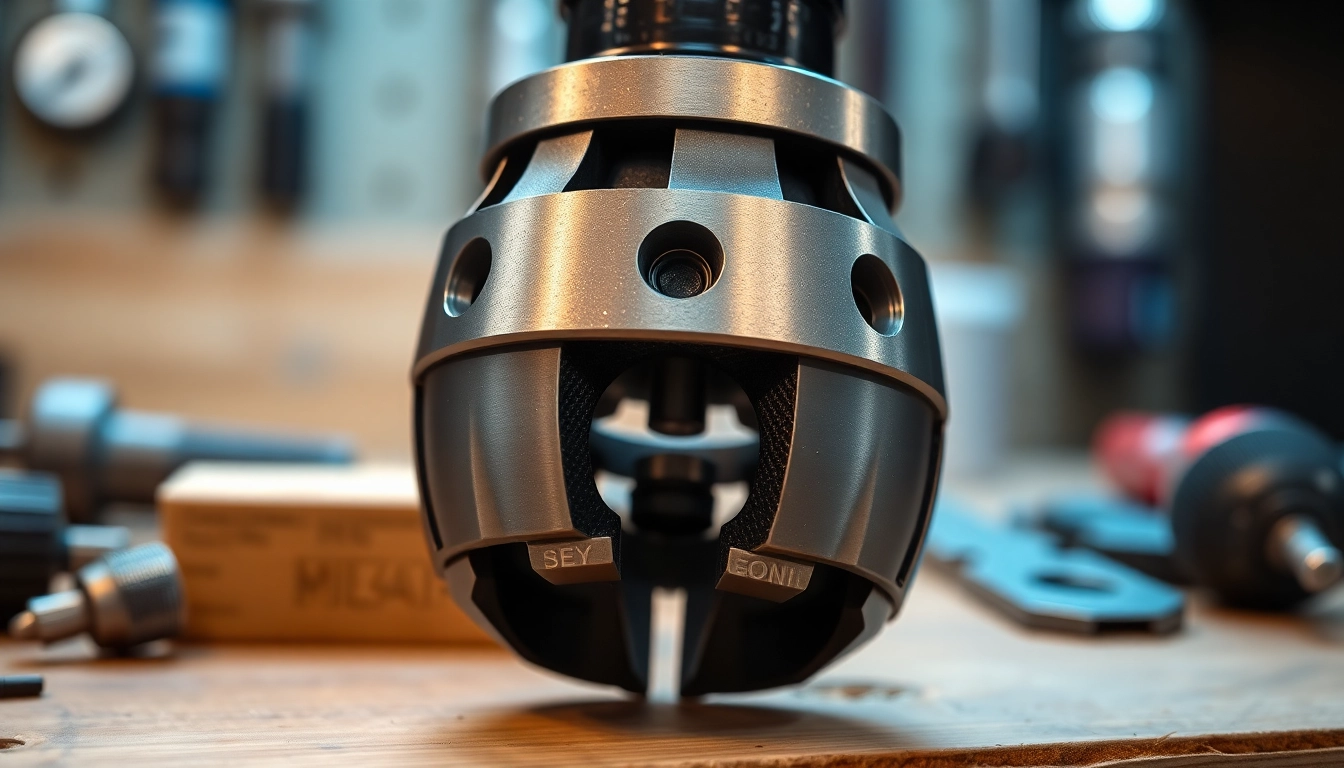Understanding the Basics of Drill Chucks
What is a Drill Chuck?
A drill chuck is a crucial component of any drilling machine, serving as the interface between the drill bit and the drill itself. It securely holds the drill bit in place, enabling effective drilling by ensuring that the bit rotates in alignment with the motor’s rotation. The chuck’s precision and functionality directly impact the drilling process, influencing not only hole quality but also the overall efficiency of the task at hand. You can explore various options for a drill chuck that fits your needs.
Types of Drill Chucks Explained
There are several types of drill chucks, each designed for different applications and preferences:
- Keyed Drill Chucks: These require a key to tighten or loosen the chuck around the drill bit. They offer a secure grip, making them ideal for heavy-duty application.
- Keyless Drill Chucks: These allow users to clamp and release the drill bit without a key, providing convenience and speed. They are perfect for tasks that require quick bit changes.
- Hybrid Drill Chucks: As the name suggests, these incorporate features of both keyed and keyless chucks, offering versatility for various tasks.
- Specialized Drill Chucks: Some chucks are designed for specific applications like CNC machining or reverse drilling, offering features tailored to those needs.
Key Features to Consider When Choosing a Drill Chuck
Choosing the right drill chuck involves evaluating several key features to ensure optimal performance:
- Size Range: Drill chucks come in different size capacities, typically varying between 0.3mm to 20mm. Ensure your selected chuck supports the bit sizes you plan to use.
- Materials: Look for chucks made from durable materials. High-quality steel or special alloys can enhance longevity and performance.
- Mounting Type: Compatibility with your drill’s mounting system (Morse taper, threaded, etc.) is crucial for effective operation.
- Precision: The accuracy with which a chuck holds the drill bit can significantly impact the hole quality; hence, consider brands known for high tolerance and precision.
How to Choose the Right Drill Chuck for Your Needs
Assessing Your Drill Type and Usage
The type of drill you are using is likely the first consideration in selecting a drill chuck. Different drills, from cordless to corded, may require different chuck types, and understanding your usage pattern—be it casual DIY projects or industrial applications—will influence your decision. For instance, if you frequently switch bits during your work, a keyless chuck would enhance efficiency.
Size and Compatibility Considerations
It’s vital to match the drill chuck size with the drill bit size requirements. Common sizes include 1/2”, 3/8”, and 1/4”, each catering to different needs in specific tasks. Compatibility with your drill’s arbor can dictate whether the chuck you choose will fit well. Always verify your drill specifications to avoid mismatches.
Comparing Keyed vs. Keyless Drill Chucks
This comparison is essential depending on the nature of your projects:
- Keyed Chucks: Advantages include a firmer grip for heavy-duty applications, making them suitable for materials that might otherwise slip. However, they require extra time to change bits.
- Keyless Chucks: These are much easier to operate, enabling quick changes and facilitating work speed. That said, users should beware of potential slipping during intense operations.
Installation and Maintenance Tips for Drill Chucks
Step-by-step Guide to Installing Your Drill Chuck
Installing a drill chuck correctly is essential for ensuring effective operation and longevity:
- Ensure the drill is unplugged to prevent accidents.
- If using a keyed chuck, insert the key into the provided holed and loosen the chuck by rotating it counter-clockwise.
- For keyless types, simply twist the chuck open by hand.
- Attach the chosen drill bit into the chuck and secure it adequately before tightening the chuck back into position.
- Finally, check that the bit is firmly held by giving it a slight tug to ensure it doesn’t loosen during use.
Common Maintenance Practices for Longevity
To prolong the life of your drill chuck, consider the following maintenance practices:
- Regular Cleaning: Dirt and debris can interfere with the chuck’s function, so regularly cleaning it helps maintain its efficacy.
- Lubrication: Incorporate oiling the chuck’s threads and moving parts to enhance smooth operations and prevent rust.
- Check for Damage: Regularly inspect the chuck for chips or cracks and replace it if necessary to avoid more significant issues.
Troubleshooting Common Drill Chuck Issues
Common drill chuck problems can hamper project efficiency, but many can be resolved easily:
- Loose Bit: If the drill bit keeps slipping, ensure that it is correctly secured and consider replace the chuck if it is worn.
- Sticking Mechanism: If the chuck doesn’t rotate smoothly, clean it thoroughly and check for improper lubrication.
- Incompatibility: If an inappropriate chuck is being used, always refer to the drill specifications before purchasing replacements.
Enhancing Your Work Quality with Drill Chucks
The Impact of Drill Chuck Accuracy on Project Outcomes
The accuracy of the drill chuck directly affects the quality of holes produced. Higher precision chucks minimize the chances of wobbling, resulting in cleaner holes and reducing the risk of damage to the drill bit or workpiece. For projects requiring intricate work, investing in a precision drill chuck can elevate the overall finish of the task.
How a Quality Drill Chuck Can Save You Time
Efficiency is a crucial aspect of any project. A high-quality drill chuck reduce friction during bit changes, streamline operations, and enable smoother drilling processes, minimizing downtime and enhancing productivity. Investing time in choosing a quality drill chuck upfront can save significant time and frustration in the long run.
Utilizing Specialized Drill Chucks for Specific Projects
For specialized projects, using specific chucks designed for unique applications can improve accuracy and reduce wear on tools. For instance:
- For Woodworking: Certain chucks offer features like enhanced grip for softer materials.
- For Metalworking: Chucks designed for higher torque can efficiently manage heavier bits and harder materials.
Top Drill Chuck Brands and Their Unique Features
Comparing Leading Brands in the Drill Chuck Market
The drill chuck market is vibrant, with several reputable brands offering innovative solutions:
- Jacobs: Known for their high-quality keyed chucks, they offer great precision and durability.
- Röhm: This brand provides both keyed and keyless options, focusing on torque and concentricity.
- Albrecht: They are often hailed as leaders in precision; their chucks are pricier but are preferred for high-end applications.
- DEWALT: Offers a range of durable chucks designed for their power tools, known for reliability in tough conditions.
Customer Reviews: What Users Say About Different Drill Chucks
Reading customer reviews can provide invaluable insight into real-world performance:
- Jacobs: Users frequently praise their longevity and grip strength.
- Röhm: Customers appreciate the ease of use and precise fit in drills.
- Albrecht: While higher in price, many users note the discrepancies in quality compared to standard chucks are worth the investment.
Where to Buy: Best Sources for High-Quality Drill Chucks
For purchasing quality drill chucks, consider reputable online retailers, industrial supply stores, and specialized tool outlets. Not only can these locations offer a diverse selection, but many also provide customer service to assist in choosing the right product. Platforms like Amazon or dedicated tool retailers like Home Depot and MSC Industrial Supply feature extensive inventories and customer reviews to help buyers make informed decisions.



